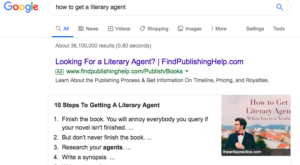 If you google the phrase “how to get literary agent,” you will find at least 20 Google pages of results. The accumulated information comes from writers’ websites, writers’ magazines, from bloggers, from literary agents themselves, from editors eager to polish up your manuscript before you submit to an agent and from authors — like myself — who have found an agent.
If you google the phrase “how to get literary agent,” you will find at least 20 Google pages of results. The accumulated information comes from writers’ websites, writers’ magazines, from bloggers, from literary agents themselves, from editors eager to polish up your manuscript before you submit to an agent and from authors — like myself — who have found an agent.
As I posted, last week, I was super happy to sign with Paula Munier, the agent I really wanted and whom I met two years before sending her my manuscript. It took approximately five months (not a long time in the publishing business, as it turns out) from the time of emailing my manuscript to Paula and signing the contract with her agency.
So, this week’s blog is not about how to get a literary agent. It’s about how to best use your time while waiting for a response from your first choice. And, that includes drawing up a Plan B — just in case!
A Long Vacation

In the beginning, I was quite happy for Paula to take her time with my manuscript. While it was in her hands, I finally had time to enjoy other activities like reading, playing tennis, catching up with friends, taking a couple of road trips and planning the renovation of our Florida condo. It was like being on a long vacation.
Okay, yes, I admit I did tweak and edit and re-read my manuscript a couple of times. On the other hand, I resisted most of the advice that’s out there that tells you to focus on your next novel. I stayed away from that draft completely. (Yes. I do have a draft of another novel.)
Instead, I went to Plan B which required slogging through the nitty-gritty process of selecting and targeting about a dozen other agents with whom I figured I stood the best chance of getting representation — if Paula declined.
It turned out to be an interesting and challenging process and, with benefit of hindsight, something of a fun one, too: Who was going to end up on my list of agents to query?
Requires Research
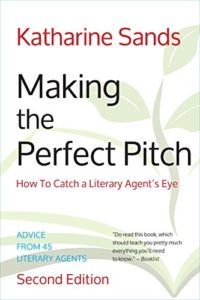 In Making The Perfect Pitch, literary agent Katharine Sands has compiled advice from more than forty agents. Advice like this :”Your book will not be for everyone” says Anna Ghosh of the Scovil Chichak Galen Lit Agency “and the most irresistible query can fail if the agent has no interest in the subject.”
In Making The Perfect Pitch, literary agent Katharine Sands has compiled advice from more than forty agents. Advice like this :”Your book will not be for everyone” says Anna Ghosh of the Scovil Chichak Galen Lit Agency “and the most irresistible query can fail if the agent has no interest in the subject.”
And, like this: “Send letters only to agents who handle the kind of book you’ve written,” writes Joseph Regal of Regal, Hoffman and Associates. “If you get past no with your query but then the agent rejects your pages, don’t fret, many, many talented writers have been rejected, not once or twice but dozens of times.”
Treacherous Terrain
Zeroing in on the right agents was a little like being on a military exercise to flush out targets who are hiding and camoflauged in treacherous terrain. You have to be very methodical, well-organized and well-equipped.
“Finding the right agent will take some research. Of course, first you have to know what kind of book you’ve written,” says Lori Perkins of the L.Perkins Agency in Making The Perfect Pitch.
In other words query agents who represent your genre (and hopefully you know by now what that is.) In my case, I needed to find agents who deal in the thriller category, specifically in the sub-genre of suspense, psychological suspense and/or domestic noir.
First step: look in the Acknowledgments chapters of novels you’ve read and love in the same genre in which you are writing. Most authors will generally always credit their agent. And, that’s a start, but the best resource bar none is the website publishersmarketplace.com. In one of her most popular posts, publishing guru, Jane Friedman agrees though I first heard about it from Michael Neff, the director of the Algonkian Novel Workshop (where I also met Paula.)
Best Website
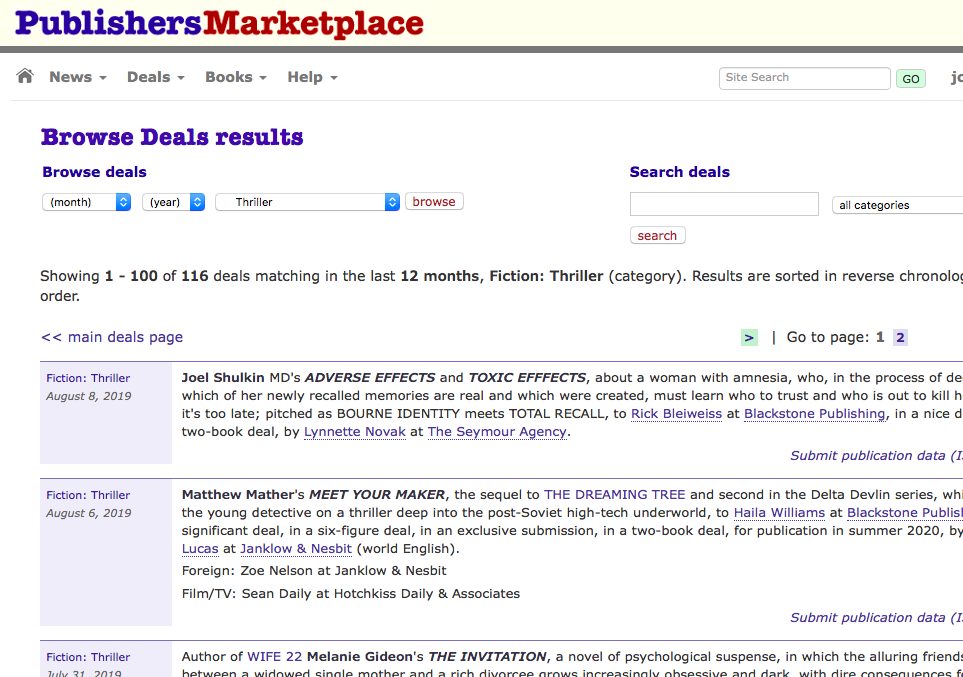
Michael suggested subscribing to it (at $25 per quarter) because it would give us an idea of what was trending and what was selling in fiction. More helpfully, it provides a wealth of information about agents: Who are the top agents in any particular genre; what kind of deals they’ve made, how many authors they represent and who those authors are; what are the novels they’ve sold; to whom have they sold the novels?
But the categories are pretty broad. So, accessing a list of top 100 agents in the thriller genre, I had to winnow out those who who represented authors of spy, legal, military, and political thrillers. I also discarded agents in the very big, long-established agencies who had assistants who, in turn, also had assistants to look through queries and email out rejections.
Once I compiled a list of a about a dozen, I looked for more information about them on their agency websites and/or in their blog posts. I also checked out their Twitter accounts.
QueryTracker
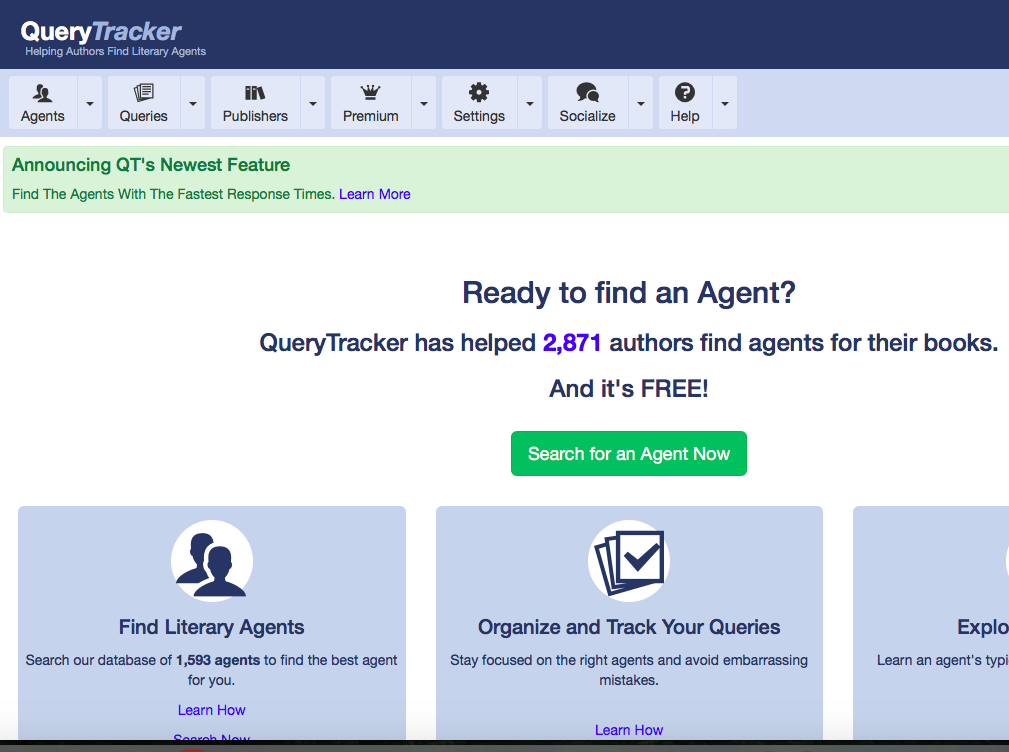
Then it was over to Querytracker.net, another indispensable website with information as to whether agents are closed or open to queries, whether they accept email queries or submissions through Query Manager (an online form which an increasing number of agents are using.)
A typical online form will include space for your query letter, your bio, a one-line pitch and similar published novels or “comps” as we call them. It will also inform you of what the agents wants to see with the query (usually first 10-50 pages of manuscript and a synopsis.)
Basic version of querytracker also provides comments about the individual agents from writers who have submitted queries to them. I did not find these comments (for example, how long it took to get a form rejection) particularly helpful since there’s no way of deducing anything about the writer and his/her level of craft, nor whether the query letter contained typos!
What I found much more helpful was where a particular agent had “success stories,” and where an author who’d signed with the agent detailed how long it had taken, and produced the query letter which he/she had submitted.
The Waiting Game
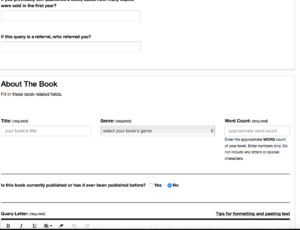 Having done the research, I was curious enough about the process to put out some feelers while waiting for Paula to get back to me. I sent out four queries to agents picked at random from my list of 12.
Having done the research, I was curious enough about the process to put out some feelers while waiting for Paula to get back to me. I sent out four queries to agents picked at random from my list of 12.
One immediately declined. One declined but suggested I query another agent in her agency — which I did, and who requested my full manuscript. And, a second one requested a full manuscript but then declined less than 24 hours after I uploaded the ms. to her.
That was fine. I was prepared for some rejection. I didn’t take it personally. Anyone who doesn’t know that book publishing is the most subjective business in the world, needs to put away their manuscript and forget about becoming an author.
Again some snippets from Making The Perfect Pitch:
“Even within our agency we have novels where somebody will say I hated the characters and somebody will say, oh, I loved the characters,” says Jane Dystel of Dystel, Goderich, & Bourret LLC
“A perfect pitch might not register for reasons beyond the author’s immediate knowledge or control — anything from personal likes and dislikes to imperfect timing (the agent has just signed up a similar work or has a book in the same category that is performing poorly)” — Rita Rosenkranz of Rita Rosenkranz Literary Agency.
“I’ve certainly sent my share of rejections to authors whose books later appeared in the stores… No-one’s taste is infallible,” notes Esmond Harmsworth of Aevitas Creative Agency
Surprise Reaction
Several weeks later, I decided to query two agents who were at the top of my list of alternates. One was London-based. She represented a couple of my favorite authors (but hey, how cool if I could also write off trips to London as tax-deductible business meetings with agent?) She said she read every query and responded to every query but it would take 12 weeks.
The second agent in this batch requested my full manuscript. So, full manuscripts were still in the hands of two agents along with some queries I’d sent last minute when Paula made the offer.
I first contacted the two agents holding my full manuscript in their “reading queues.” Each had asked to be notified if I received an offer. Reasonable request, I figured, since why waste time reading a manuscript that had already been “snapped” up?
What then transpired, surprised me since both replied to suggest that if I had not yet accepted the offer, and if I could hold off accepting the offer, they’d read the manuscript by the deadline I set. I have since discovered that some authors go along with this scheme of things, and then have three or four other offers to consider.
But, that wasn’t going to work for me. For one, my first offer of representation had come from my first-choice agent and I was already discussing a contract with her.
For another, it’s my idea of a nightmare to be faced with too many choices whether it’s in kitchen faucets (see above-mentioned condo renovation) or potato chips — or literary agents.
You are a great wealth of information, as always!
I’m happy if someone finds my experience useful. Thanks for reading and commenting.